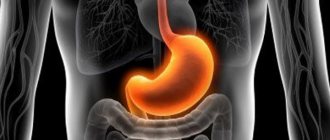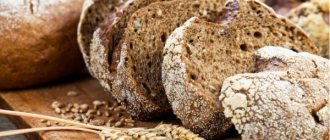The role of the nurse in caring for patients with gastritis
It is the nurse who must help a person in a difficult situation, mobilize his will, find the right way to solve problems, and must give people reassurance and hope. The priority problem is pain in the epigastric region; among psychological problems, 100% of respondents experienced a decrease in emotional background.
It is the nurse who must help a person in a difficult situation.
The nurse should:
- ensure strict adherence to the established dietary regimen;
- Explain to the patient the importance of following a diet and drinking mineral water;
- explain to relatives the need to bring parcels in accordance with the diet;
- control physiological functions;
- administer medications to relieve pain as prescribed by a doctor;
- tell the patient about preventive measures, the effectiveness of which depends on the patient’s efforts.
A patient’s recovery in a hospital depends not only on well-chosen treatment by a doctor, but also on properly organized nursing care. Nursing care is important, since after discharge from the hospital the patient will have to adhere to a diet and daily routine, and it is the nurse’s responsibility to convey to the patient the importance of following these rules for his health.
Nursing process for chronic gastritis
The nurse enters into a trusting relationship with the patient, trying to reliably find out the circumstances - risk factors for chronic gastritis. Information is collected about the nature of nutrition from childhood, about appetite, the nature of stool, bad habits, about the psychological microclimate at home and at work, about industrial intoxications, previous diseases, and hereditary predisposition.
The objective symptoms of the disease are determined. As a result of the nursing examination, the patient's problems (nursing diagnoses) are established. For each problem that arises, the nurse sets new goals and plans nursing interventions to care for the patient. The nurse documents all data on the results of work.
Nursing process for gastritis
A nurse in the gastroenterology department must know the clinical manifestations of the disease, possible patient problems, emergency care algorithm for acute gastritis, principles of treatment and prevention of gastritis, know and follow the distribution and dosage of prescribed medications.
The nurse must be able to carry out the nursing process, give recommendations on the prescribed diet, monitor the intake of medications, provide special literature if the patient lacks knowledge about his disease, prepare the patient for the study, be able to carry out fractional and duodenal intubation, gastric lavage, and administering enemas. Provide assistance with vomiting, diarrhea, fever.
Nursing examination for gastritis:
- medical history, life history and allergy history;
- patient complaints: pain in the chest and epigastric region, repeated vomiting; The vomit contains blood, mucus, and tissue fragments. On the mucous membrane of the mouth, lips, cheeks there are traces of burns (swelling, hyperemia, ulcerations). There may be jaundice due to hemolysis of red blood cells. Possible perforation of the stomach wall;
- examination of the patient: the skin may be pale, the tongue is coated with a grayish-white coating;
- palpation, pulse measurement, blood pressure;
- diet: the first two days - fasting, drinking plenty of fluids. Next, gradually expand the diet by increasing the volume of foods rich in plant fiber (cabbage, beets) and enhancing intestinal function, monitoring strict adherence to the diet and diet;
- to eliminate pain, as prescribed by a doctor, give the prescribed dose of medication;
- informing the patient about his state of health: psychologically setting the patient up for a speedy recovery. Explain to relatives the importance of positive emotional contact. Selection of information booklets;
- prevention of possible complications: diet, timely treatment of chronic processes in the body, giving up bad habits;
- assessment of the patient's condition.
What food can be a medicine for the stomach?
Some products not only do not harm, but even help the gastric mucosa to reduce inflammation and restore structure.
- Sea buckthorn oil has an enveloping and wound-healing effect, therefore it helps to neutralize the negative effects of hydrochloric acid on the inner lining of the stomach. For medicinal purposes, it is taken 1 tsp. 30 minutes before breakfast and dinner.
- It is recommended to drink half a glass of potato juice before meals once a day. The course of treatment is seven days. Freshly squeezed potato juice helps fight Helicobacter, reduces heartburn, and normalizes gastrointestinal motility.
- Milk can increase the pH of gastric juice, neutralizing the acid. It is better to drink it on an empty stomach or immediately before going to bed, 200 ml.
- Kissels on any basis are effective for gastritis due to their enveloping effect. The inside of the stomach seems to be covered with a protective film, and hydrochloric acid cannot harm it. Milk and oatmeal jelly bring maximum benefit.
- Chamomile tea reduces inflammation and irritation of the gastric mucosa. Dried chamomile is poured with boiling water at the rate of 1 tsp. per glass of liquid. Leave for a quarter of an hour and drink half an hour before meals.
It must be taken into account that the therapeutic effect of food products is not a complete alternative to drug therapy. It only complements their action and, in some cases, reduces the need to take symptomatic medications.
Important! In the literature you can often find recommendations for reducing the acidity of gastric juice using a soda solution. However, you should not abuse this method, otherwise you can provoke a boomerang effect: when sodium bicarbonate comes into contact with hydrochloric acid, carbon dioxide is released.
It is a stimulant for parietal cells that produce hydrochloric acid. Thus, after short-term relief, the acidity of gastric juice increases even more.
Caring for patients with chronic gastritis
Chronic gastritis is a pathological condition that develops as a result of inflammation of the gastric mucosa. In chronic gastritis, along with inflammatory changes in the mucous membrane, dystrophic changes are observed. In advanced cases, atrophic changes in the mucous membrane are observed, with damage to the gastric glands, which leads to a sharp decrease in the secretory function of the stomach. The symptoms of the disease are determined by the state of the secretory function of the stomach.
Rules for caring for patients with chronic gastritis
Patients are treated in a clinic, since acute symptoms require fairly rapid intervention. Patients with chronic gastritis are usually not hospitalized, since they are fully able to work. Smoking and drinking alcohol are strictly prohibited.
Maintaining proper nutrition and an appropriate diet. The diet is prescribed in accordance with the results of the study of gastric juice.
Treatment of patients with hCG is carried out in a clinic, since acutely occurring symptoms require fairly rapid intervention
However, regardless of the results of the study of gastric juice, the patient should not eat “heavy” foods (fatty meat, canned foods, spicy dishes, butter pies, etc.). If there is increased secretion of gastric juice, you should not eat anything “spicy” (spices, sauces, salty dishes), since these products increase the secretion of gastric juice.
If the patient has high acidity, black bread, sauerkraut, and sour fruits are not recommended. For gastritis with reduced secretory function of the stomach, some spices and seasonings are acceptable, which can increase the acidity of gastric juice, but the food is given in a well-chopped form (“mechanical sparing”).
With high acidity, the table should be mechanically and chemically gentle (diet No. 1), and with low acidity - mechanically gentle (diet No. 2) (see section “Diets for diseases of the digestive system”). Mineral waters have a good effect.
Monitoring the timely and complete intake of medications prescribed by the attending physician, which are aimed at correcting the acidity of gastric juice, as well as normalizing gastrointestinal motility. If the processes of intestinal digestion are disrupted (with gastritis with reduced secretory function), which is manifested by diarrhea, then enzyme preparations (panzinorm, festal) are simultaneously prescribed, which should be taken with meals.
Chronic gastritis is a pathological condition that develops as a result of inflammation of the gastric mucosa
Patients with chronic gastritis with reduced secretion of gastric juice (especially with the absence of hydrochloric acid in gastric juice) are registered at the dispensary. Once a year, such patients undergo gastroscopy or an X-ray examination of the stomach, since they are at risk for developing stomach cancer.
The complex of therapeutic measures includes physiotherapeutic procedures (mud therapy, diathermy, electro- and hydrotherapy). Vitamin therapy is recommended, especially taking nicotinic and ascorbic acids, vitamins B6, B12. Creating conditions for deep and restful sleep. Sleep duration should be at least 8 hours. Creating a favorable environment at home and at work. The patient should not worry or be irritated.
Physical education and sports classes. Hardening the body. It is necessary to carry out timely sanitation of the oral cavity, treatment and prosthetics of teeth. Treatment of patients with chronic gastritis can be carried out in gastroenterological sanatoriums. It should be remembered that if the secretory function of the stomach is reduced, thermal procedures are not prescribed due to the risk of developing stomach cancer. Prevent exacerbations of the disease. Even when remission occurs, you should follow your diet and diet.
Problems with chronic gastritis
All forms of chronic gastritis are usually characterized by a long-term course, often with alternating periods of exacerbations and remission. Exacerbations of chronic gastritis can be provoked by nutritional errors, alcohol abuse, and taking certain medications (salicylates).
Over the years, chronic gastritis usually takes on a progressive course. Often starting in the antrum, superficial gastric changes spread further to the mucous membrane of the fundus of the stomach and become diffuse over time.
In addition, gastric changes progress not only “in breadth”, but also “in depth”, gradually acquiring an atrophic character. The development of atrophic changes in the mucous membrane of the fundus of the stomach is accompanied by a decrease in gastric acid secretion and, in some cases, the addition of Achilles diarrhea, various manifestations of the syndrome of insufficiency of digestion and absorption.
With hemorrhagic (erosive) gastritis, hidden or obvious (sometimes profuse) gastric bleeding may occur. Of fundamental importance is the question of the possibility of the occurrence of peptic ulcers and malignant neoplasms of the stomach against the background of chronic gastritis. The progression of atrophic gastric changes actually helps to reduce the stability of the gastric mucosa, but at the same time the secretion of hydrochloric acid, which is the main factor in ulcer formation, noticeably decreases.
The relationship between chronic gastritis and stomach cancer remains controversial. Despite the contradictory opinions, it can still be considered established that some forms of chronic gastritis (diffuse atrophic gastritis, atrophic gastritis of the gastric stump, atrophic gastritis in patients with B12-deficiency anemia), accompanied by a decrease in gastric acid secretion, cause a more frequent occurrence of stomach cancer.
Caring for a patient with acute gastritis
Acute gastritis is an acute inflammatory lesion of the gastric mucosa, accompanied by impaired secretion and motility.
Rules for caring for patients with acute gastritis
With the development of acute gastritis, complete abstinence from food intake is necessary for 1-2 days. Prescribe plenty of warm drinks in small portions (strong tea, warm alkaline mineral water). The stomach must be completely emptied of food debris; for this, the stomach is washed with an isotonic solution of sodium chloride or a 0.5% solution of sodium bicarbonate (1 teaspoon of baking soda per 1 liter of water).
If pain in the epigastric region is severe, then, as prescribed by your doctor, you should place a warm heating pad on your stomach. If you have a chill, place a heating pad on your feet. Monitoring the complete and timely intake of medications prescribed by a doctor.
If pain in the epigastric region is severe, then as prescribed by the doctor, you should put a warm heating pad on your stomach
In the acute period, bed rest is indicated. Avoid psychological stress. The patient should not worry or be irritated. Limiting physical activity in the first days of illness. Creating conditions for deep and restful sleep.
Sleep duration should be at least 8 hours a day. It is necessary to monitor pulse rate, blood pressure, body temperature, food tolerance, stool (frequency, consistency). From the 2-3rd day, diet No. 1A is prescribed (see section “Diets for diseases of the digestive organs”): the patient is given 6 times a day in small portions low-fat broth, slimy soup, pureed rice or semolina porridge, jelly, cream, milk for night.
On the 4th day, the patient can be given meat or fish broth, boiled chicken, steamed cutlets, mashed potatoes, and white dried bread. After 6-8 days, the patient is transferred to normal nutrition. To prevent the development of chronic gastritis, the patient is advised to eat a balanced diet and avoid abuse of alcoholic beverages and smoking.
Rules for caring for patients with acute corrosive gastritis
One of the types of acute gastritis is corrosive gastritis, which occurs due to the ingestion of strong acids, alkalis, salts of heavy metals, and ethyl alcohol into the stomach.
In case of acute corrosive gastritis, urgent hospitalization is required in the surgical department or poison control center
Urgent hospitalization to the surgical department or poison control center. Gastric lavage with plenty of warm water. If affected by alkalis, the stomach must be washed with a 0.5-1% solution of acetic acid or water to which several crystals of citric acid have been added per 1 liter of water.
Maintain bed rest for the first 2-3 days. Monitoring blood pressure and pulse. Monitoring the character of the stool (the appearance of dark stool indicates an admixture of blood). Monitoring the complete and timely intake of medications prescribed by a doctor. Avoid psychological stress. The patient should not worry or be irritated.
Limiting physical activity in the first days of illness. Creating conditions for deep and restful sleep. Sleep duration should be at least 8 hours a day. Complete fasting for 1-2 days. From the 3rd day, therapeutic nutrition is prescribed: the patient is given milk, pieces of butter, vegetable oil 200 g per day, beaten egg whites.
The problem of acute and chronic gastritis
Gastritis of the stomach is a disease that manifests itself in the form of inflammation of the gastric mucosa. Modern medicine in this concept unites a whole group of chronic and acute diseases of the stomach, which today are considered one of the most common problems of the digestive system.
There are two forms of the disease chronic gastritis; acute gastritis. Acute gastritis is manifested primarily by severe pain localized in the upper abdomen. This pain is often accompanied by loose stools, bloating, as well as nausea and vomiting. These signs of gastritis disappear after proper treatment.
Chronic gastritis, like acute gastritis, manifests itself in the form of painful symptoms, but the nature of the pain is different. The chronic form is characterized by an aching or pressing form of pain. Unpleasant sensations can occur after eating and on an empty stomach. In some cases, patients note other unpleasant symptoms, such as: loss of appetite, nausea and vomiting, belching, unpleasant taste in the mouth, etc. metallic taste in the mouth.
It is also worth noting that the chronic form can occur completely unnoticed by the patient. The absence of any symptoms and normal appetite is not a guarantee that there is no disease at all. Remaining invisible for several years, gastritis slowly destroys the glands of the stomach.
Nursing care for a child with gastritis
Nursing care for a child with acute gastritis
Acute gastritis is provoked by food poisoning, consumption of poor quality food, overeating (especially fatty and spicy foods), frequent consumption of food containing coarse fiber, insufficient chewing of food, long-term treatment with salicylates, sulfonamides, poisoning, allergies.
In case of acute gastritis, bed rest should be observed for 2–3 days. At the very beginning, the stomach is lavaged to free it from stagnant food residues. Then fasting is prescribed for 8–12 hours, during which the patient must drink large quantities of chilled tea, a mixture of saline with 5% glucose solution (in equal proportions), and rehydron.
After 12 hours, the patient begins to be given mucous pureed puree soups, low-fat broth, jelly, crackers (chew thoroughly!), and porridge in small portions. Next, the diet is gradually expanded, and by the 5th–7th day the patient is transferred to a normal, age-appropriate diet.
Nursing care for a child with chronic gastritis
All of the above factors also play an important role in the development of chronic gastritis. In addition, this disease develops with some endocrine pathology, chronic kidney diseases, and cardiovascular diseases. Heredity and reduced immunity are important.
For gastritis, bed rest should be observed for 2–3 days
Chronic gastritis. During the period of exacerbation, bed rest is prescribed, the duration of which depends on the severity of the exacerbation and can be up to 4 weeks. The child needs to be provided with physical and emotional peace and individual care. The room where the patient is located must be regularly ventilated and wet cleaned.
Nursing care for a child with acute and chronic gastritis, diet therapy
Food must be mechanically, chemically and thermally gentle. Tables No. 1a (5–10 days), No. 1b (10–20 days), No. 1 (before remission), No. 2 (during remission) are recommended. Included in the diet: milk, cream, liquid milk porridge (semolina, rice), milk or slimy cereal soups, soft-boiled eggs or in the form of an omelet, boiled meat soufflé, jelly and jelly, juices. Salt is limited to 6–8 g per day.
When moving to table No. 1, to the listed products you can add dry cookies, noodles, boiled fish, steamed cutlets, fresh cottage cheese, curdled milk, boiled and chopped herbs and vegetables, boiled sweet fruits and berries, compotes.
Food for gastritis should be mechanically, chemically and thermally gentle
After the onset of remission, they move to table No. 2: they are given low-fat meat and fish, mild cheese, meat broth and fish soup, strong vegetable broths, butter, sour cream, cream, cottage cheese, vegetable oil, eggs and dishes made from them, herbs, pureed vegetables and fruits, tea, cocoa, day-old white and black bread, raw vegetable, fruit and berry juices, rosehip decoction. The amount of salt is not limited. When belching, it is recommended to give 50–100 ml of white cabbage juice, plantaglucide, and enzyme preparations daily.
Dispensary observation is carried out by a pediatrician and gastroenterologist according to the following plan: after an exacerbation of the disease during the first six months - once every 2 months, then quarterly for 2-3 years, then - 2 times a year. 6. In spring and autumn, anti-relapse treatment is carried out in courses of 1–2 months. 7. 3-4 months after the end of the exacerbation, during a period of stable remission, sanatorium-resort treatment is recommended: Zheleznovodsk, Essentuki, Truskavets, etc. Treatment with mineral waters as prescribed by a doctor is useful.
Sources:
- https://knowledge.allbest.ru/medicine/3c0a65635a3ac78a5d43b89521206d27_0.html
- https://gastritinform.ru/www.meduhod.ru/deseases/gastrit_khron.shtml
- https://aupam.ru/pages/uhod/ruk_uh_bnd/page_18.htm
- https://aupam.ru/pages/uhod/sprav_med_sest/page_13.htm
- https://applied-research.ru/ru/article/view?id=10637
- https://infourok.ru/metodicheskaya-razrabotka-sestrinskiy-uhod-pri-gastrite-2678009.html
Authorized Products
Let's briefly look at those products that can (and even need) to be included in the diet for gastritis with high acidity, and on prohibited delicacies. Let's list them in the table.
| Product groups | Can | It is forbidden |
| Soups | Puree, slimy, milk, vegetarian soups, soups based on diluted meat or fish broths. | Rich broths, tomato, pea, mushroom, spicy soups. Traditional borscht, sauerkraut cabbage soup, solyanka, rassolnik. Seasoning soups. |
| Meat, poultry | Chicken, veal, turkey, rabbit, beef. | Lamb, pork, duck and goose meat. |
| Fish | Perch, pollock, hake, cod, tilapia, flounder, trout, pink salmon, salmon, grenadier. Shrimp, squid. | Fatty herring, halibut, sturgeon, eel, lamprey. |
| Eggs | Soft-boiled omelettes. | Fried, hard-boiled. |
| Porridge | Oatmeal, buckwheat, rice, semolina. Limited: pearl barley. | Corn, peas, millet, wheat. |
| Vegetables | Heat-treated: potatoes, melons, carrots, beets, eggplants. Limited: cucumbers, tomatoes, baked or boiled onions. | Cabbage, rutabaga, radish, bell pepper, turnip, legumes, radish, spinach, garlic, raw onion. |
| Fruits | Persimmons, sweet pears, apples, bananas, avocados. Limited: watermelons, melons. | Citrus fruits, pomegranates, kiwi, sour apples, plums, peaches, grapes, dried fruits. |
| Bakery products | Stale bread, crackers, croutons, biscuits and other products made from uneatable dough. | Fresh bread, rich pastries. |
| Dessert | Sweet mousses, jelly, natural marmalade, marshmallows, marshmallows, honey, jam from non-acidic berries (cherry, strawberry, Victoria). | Chocolates, pastries, pies, ice cream, sour berry jam (cranberries, currants, gooseberries). |
| Beverages | Kissels, apple/pear compote, weak English black tea (with milk), green tea, herbal infusions, milk, non-carbonated mineral water with an alkaline reaction, milkshakes, carrot and pumpkin juice. | Infused black tea, coffee, chicory, dried fruit compote, alcohol, soda, fruit juices, sour mineral water. |
| Dairy | Whole milk, fermented baked milk, Varenets, one-day kefir up to 2.5% fat, natural low-fat yogurt, cottage cheese after heat treatment, soft unsalted cheeses. | Three-day or more high-fat kefir, raw cottage cheese, hard salty cheeses with high fat content. Any dairy products with artificial additives |
| Other | Pasta, homemade dumplings with dietary meat, butter and vegetable oils, dill, parsley. | Mushrooms, nuts, canned food, smoked meats, spices. |
Advice. Despite the beneficial properties of fermented milk products, if the acidity of the gastric juice is high, they can only aggravate the problem. You should not completely exclude them from your diet, but it is important to buy only fresh products without extraneous additives and with a low percentage of fat content. The exceptions are Varenets and Ryazhenka, which are safe for any form of gastritis.











